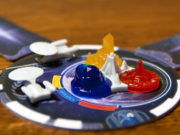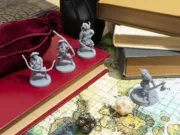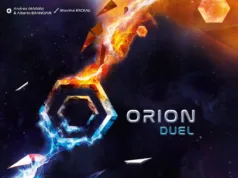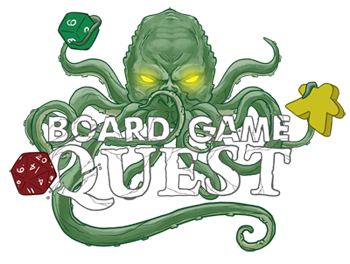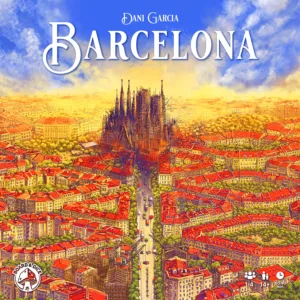 In the classic British sitcom Fawlty Towers, there is a character played by Andrew Sachs named Manuel. He’s a kind and hard-working employee but is also fairly inept at his job no matter how hard he tries to do well. Manuel is also routinely mistreated by his boss, John Cleese’s snobby and rude Basil Fawlty. Basil hurls insults and the occasional physical abuse at Manuel, often blaming him for any of the issues plaguing his hotel at any given time. When asked to explain Manuel’s errors—perceived or otherwise—Basil will explain to Manuel to his confused guests with the refrain, “You’ll have to forgive him; he’s from Barcelona.”
In the classic British sitcom Fawlty Towers, there is a character played by Andrew Sachs named Manuel. He’s a kind and hard-working employee but is also fairly inept at his job no matter how hard he tries to do well. Manuel is also routinely mistreated by his boss, John Cleese’s snobby and rude Basil Fawlty. Basil hurls insults and the occasional physical abuse at Manuel, often blaming him for any of the issues plaguing his hotel at any given time. When asked to explain Manuel’s errors—perceived or otherwise—Basil will explain to Manuel to his confused guests with the refrain, “You’ll have to forgive him; he’s from Barcelona.”
Today’s review is of the game Barcelona for 1-4 players. It’s designed by Dani Garcia and plays in 75 minutes or so.
Gameplay Overview:
Barcelona is action selection and tile/worker-placementish game in which players become builders in 19th-century Barcelona. (Believe it or not the theme is actually pretty good in this one, which doesn’t matter of course, but is still kind of fun.) I’m going to give the briefest of brief overviews of the gameplay here. The game isn’t that complicated, but there are a lot of things to do on any given turn and a whole bunch of edge cases that factor in.
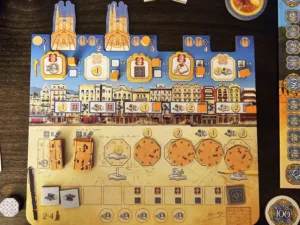
The board for Barcelona has lines of areas that trigger actions along two of its borders and a diagonal running through it. On each player’s turn, they will place two citizen tokens in a stack on a street corner and then trigger the two actions that intersect with the spot where those citizens are now standing. These actions are—for the most part—fairly straightforward. Players can use these actions to gain resources or move up a multiplier track for “round” scoring (there technically aren’t rounds to speak of… more on that later). These actions also interact with the player’s specific board and can enable them to grab scoring tiles or upgrade the number of times those tiles will score at game’s end.
Should the citizens be placed in the prime position of intersecting with the diagonal street, they will also gain access to the tram action, which is very powerful and also more than a little bit confusing to explain. Basically, each player has their own tram and they can move it around Barcelona and drop off cube people (these are different people than the citizen tokens) to trigger bonus actions and score points if these cube people are placed on the player’s own previously placed street piece. Make sense? Not really, I know. This rule is a real pain to both teach and internalize.
Players can also randomize the action tiles for variability in play; essentially this just makes the tram action easier to do since it can pop up somewhere else other than the diagonal road.
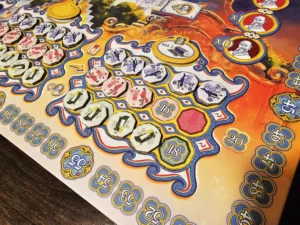
At the end of a player’s turn, they must build a building in Barcelona if they can. The building can be anywhere so long as the cost can be paid. There are three levels of building with increasing cost. The citizen tokens will dictate which street corner a building can be placed and they will act as part of the cost (theme’s a bit fuzzy on that one). Players will score points based on the lowest-visible number printed on the citizen track at the bottom of the board. These numbers will get covered as you “pay” the citizen token cost for building something and through clever placement players can cover lower numbers to get them more points.
As mentioned earlier, there aren’t any rounds in Barcelona, but there are three scoring phases that trigger when sections of the citizen track get completed. Each phase will score a specific thing—say, a point for every coin or stuff like that. After the third such phase, the game will end and whoever has the most points is the most Barcelona person in all of Barcelona.
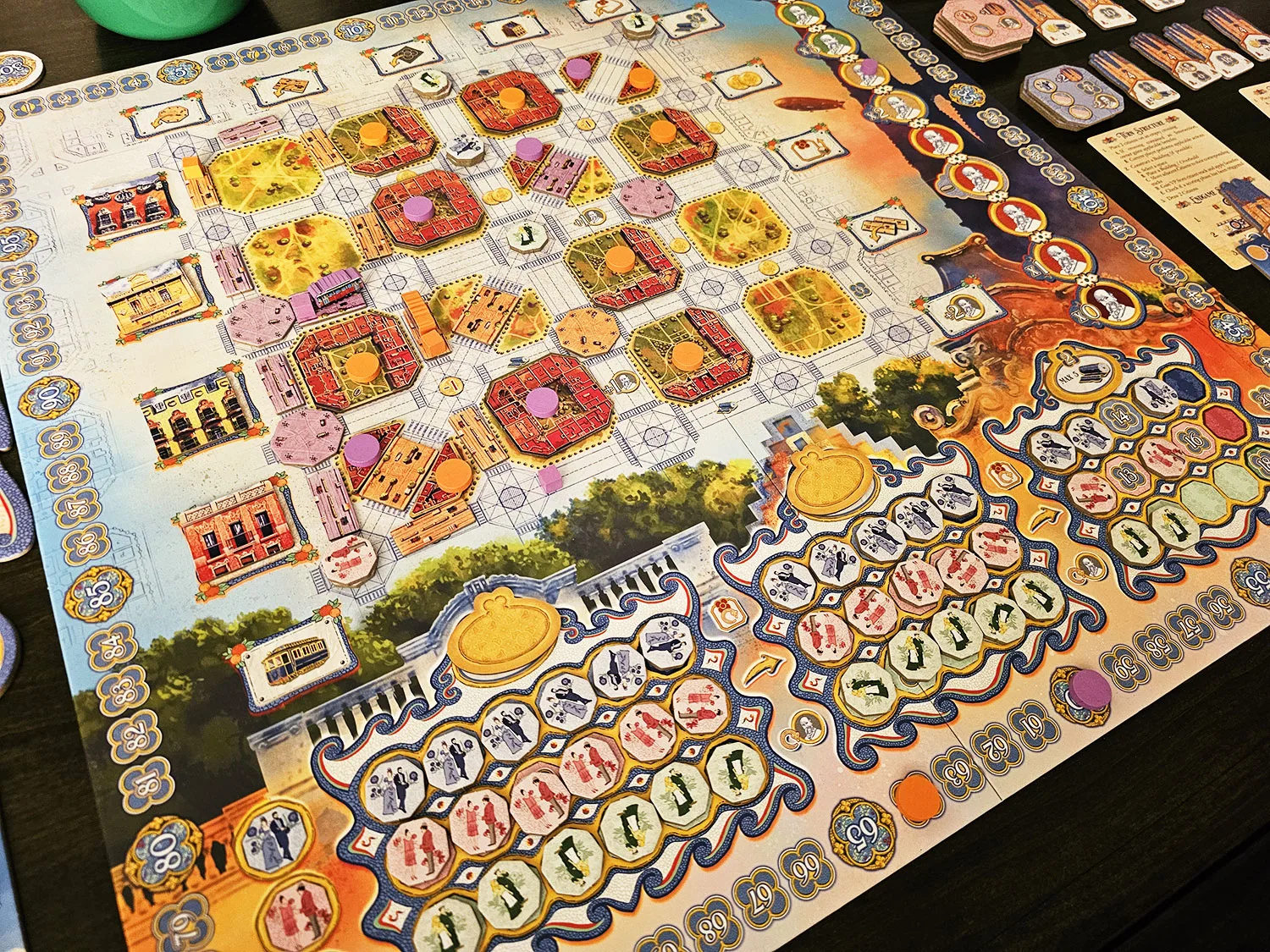
Game Experience:
I basically ran through a third of the rules in Barcelona right there, so I’ll start this section by pointing out the obvious: There’s a ton going in this game. None of it is particularly difficult to understand and turns are actually incredibly fast (so is the game for the amount of stuff going on), but there are so many bits to keep track of and decide when and how and even if using them is even worth the effort. Setup is also a bit much with all the randomizing and laying out of pieces one has to do.
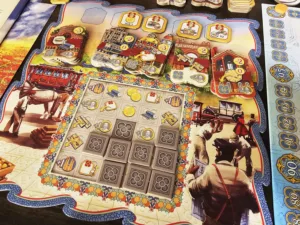
The biggest issue in a game that’s not super complicated is that the rulebook isn’t great. It’s okay, but not only are some of the concepts not laid out great (I’m looking at you, tram section), there are major rules that are thrown into sections that they don’t seem to belong in and are therefore easily missed. One example: When building on a street corner the game has a rule that you can only take one citizen token from a specific corner. This means that to build something requiring two citizen tokens, two adjacent street corners need people in them. Simple, right? Well, this rule is only mentioned in a parenthetical note as part of a different rule. This is a pretty big rule and dictates a lot of the game’s decision space.
Now that that stuff is out of the way: Barcelona is a great game. Once players actually grasp the flow of the turns and figure out how to stall scoring certain buildings or force their opponents to hit a lower scoring total the push and pull of citizen placement is a blast. There are also a ton of different paths players can take, which really helps with repeat plays.
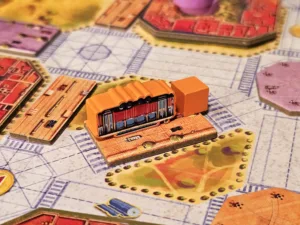
One game I focused hard on laying cobblestone (something I didn’t explain, but basically it triggers rewards and increases resource spots on a player’s board), which paired nicely with a bonus token I had multiplied a bunch. A different game I went tram-heavy, if for no other reason than because I wanted to try to understand it better for this review. I didn’t do as well (it’s very confusing), but I still had a blast playing.
This might not matter to everyone, but the scores in the game are comically high. Like… it comes with a 400-point token. I thought it was a gag until my score got into the 300s. The game still seems balanced, however, and I never really got the impression there was a runaway-leader issue. There’s just so many ways to snag points.
Final Thoughts:
Since my last play of Barcelona a few days ago I haven’t quite been able to stop thinking about it. I won’t pretend that any specific aspect of the design is innovative (I think the tram tries to be), but the way all of the pieces here interact is incredibly pleasing. Building out streets in Barcelona (another thing I didn’t talk a ton about, but it helps your tram move more quickly), for instance, might not be useful for its intended purpose involving the tram, but emptying that spot on your player board gives you a neat bonus so you want to do it anyway. Designer Dani Garcia has had a strong year with this game and Arborea and is certainly someone to watch going forward.
Final Score: 4.5 Stars. An excellent midweight Euro that overcomes a mildly clunky rulebook to deliver a wonderful mechanism salad.
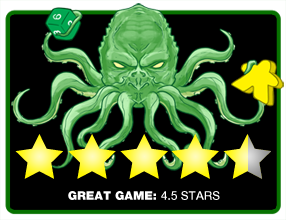 Hits:
Hits:
• Great table presence
• Impressive decision space that still doesn’t overcomplicate turns
• Mechanisms interact wonderfully
• Pretty strong theme for a Euro
Misses:
• Rulebook could be better
• The tram rules—while cool and perfectly functional—are kind of a nightmare to internalize




